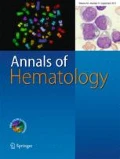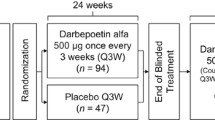Abstract
The aim of the study was to investigate the effects of erythropoietin (epoetin beta) on red blood cell (RBC) transfusions, hemoglobin (Hb) levels, and quality of life (QOL) in patients with relapsed lymphoma treated with an aggressive sequential salvage chemotherapy (SSCT) regimen. Sixty patients with early or late relapsed Hodgkin's disease (n=39) or first relapse of aggressive non-Hodgkin's lymphoma (n=21) were randomized to receive epoetin beta 10,000 IE subcutaneously three times a week or no epoetin during salvage chemotherapy. Patients in both study arms received two cycles of DHAP (dexamethasone, high-dose cytarabine, cisplatin); patients in partial remission (PR) or complete remission (CR) then received cyclophosphamide, followed by peripheral blood stem cell (PBSC) harvest, methotrexate plus vincristine, and etoposide. The final myeloablative course was BEAM (carmustine, etoposide, cytarabine, and melphalan) followed by autologous stem cell support. The primary endpoint of the study was the number of RBC units needed during SSCT. In addition, Hb levels and QOL were measured. The mean number of RBC units given in the epoetin beta arm was 4.5 compared to 8.3 in the control arm (P=0.0134). The mean Hb levels during therapy were 10.4 g/dl in the epoetin beta arm and 9.7 g/dl in the control (P=0.018). From baseline until BEAM therapy QOL (EORTC QLQ C30) and fatigue (MFI) assessment showed little QOL worsening or stable levels in both arms with a steeper increase of fatigue levels in the control group. Patients with relapsed lymphoma undergoing aggressive chemotherapy and stem cell support benefited from epoetin beta therapy, with a decrease of RBC transfusion requirements and lower rise of fatigue levels.



Similar content being viewed by others
References
Aaronson NK, Ahmedzai S, Bergman B, Bullinger M, Cull A, Duez NJ, Filiberti A, Flechtner H, Fleishman SB, de Haes JC, et al. (1993) The European Organization for Research and Treatment of Cancer QLQ-C30: a quality-of-life instrument for use in international clinical trials in oncology. J Natl Cancer Inst 85:365–376
Bauer P, Kohne K (1994) Evaluation of experiments with adaptive interim analyses. Biometrics 50:1029–1041
Beguin Y (1995) Erythropoiesis and erythropoietin in multiple myeloma. Leuk Lymphoma 18:413–421
Bron D, Meuleman N, Mascaux C (2001) Biological basis of anemia. Semin Oncol 28:1–6
Cantor SB, Hudson DV, Jr, Lichtiger B, Rubenstein EB (1998) Costs of blood transfusion: a process-flow analysis. J Clin Oncol 16:2364–2370
Case DC, Jr, Bukowski RM, Carey RW, Fishkin EH, Henry DH, Jacobson RJ, Jones SE, Keller AM, Kugler JW, Nichols CR, et al. (1993) Recombinant human erythropoietin therapy for anemic cancer patients on combination chemotherapy. J Natl Cancer Inst 85:801–806
Cazzola M (2000) Mechanisms of anaemia in patients with malignancy: implications for the clinical use of recombinant human erythropoietin. Med Oncol 17 [Suppl 1]:S11–S16
Cazzola M, Messinger D, Battistel V, Bron D, Cimino R, Enller-Ziegler L, Essers U, Greil R, Grossi A, Jager G, et al. (1995) Recombinant human erythropoietin in the anemia associated with multiple myeloma or non-Hodgkin's lymphoma: dose finding and identification of predictors of response. Blood 86:4446–4453
Chao N, Schriber J, Long G, Negrin R, Catolico M, Brown B, Miller L, Blume K (1994) A randomized study of erythropoietin and granulocyte colony-stimulating factor (G-CSF) versus placebo and G-CSF for patients with Hodgkin's and non-Hodgkin's lymphoma undergoing autologous bone marrow transplantation. Blood 83:2823–2828
Cremieux PY, Barrett B, Anderson K, Slavin MB (2000) Cost of outpatient blood transfusion in cancer patients. J Clin Oncol 18:2755–2761
Del Mastro L, Venturini M, Lionetto R, Garrone O, Melioli G, Pasquetti W, Sertoli MR, Bertelli G, Canavese G, Costantini M, Rosso R (1997) Randomized phase III trial evaluating the role of erythropoietin in the prevention of chemotherapy-induced anemia. J Clin Oncol 15:2715–2721
Demetri GD, Kris M, Wade J, Degos L, Cella D (1998) Quality-of-life benefit in chemotherapy patients treated with epoetin alfa is independent of disease response or tumor type: results from a prospective community oncology study. Procrit Study Group. J Clin Oncol 16:3412–3425
Engert A (2000) Recombinant human erythropoietin as an alternative to blood transfusion in cancer-related anaemia. Dis Manage Health Outcomes 5:259–272
Harris NL, Jaffe ES, Stein H, Banks PM, Chan JK, Cleary ML, Delsol G, De Wolf-Peeters C, Falini B, Gatter KC (1994) A revised European-American classification of lymphoid neoplasms: a proposal from the International Lymphoma Study Group. Blood 84:1361–1392
Henry DH, Abels RI (1994) Recombinant human erythropoietin in the treatment of cancer and chemotherapy-induced anemia: results of double-blind and open-label follow-up studies. Semin Oncol 21:21–28
Jelkmann W (1998) Proinflammatory cytokines lowering erythropoietin production. J Interferon Cytokine Res 18:555–559
Josting A, Rudolph D, Mapara M, Reiser M, Von Schilling C, Söhngen D, Dörken D, Diehl V, Engert A (2000) Cologne high-dose sequential in patients with relapsed and refractory Hodgkin's disease. Blood 96:3428
Koeller JM (1998) Clinical guidelines for the treatment of cancer-related anemia. Pharmacotherapy 18:156–169
Lee JS (1998) The use of erythropoietin in radiation oncology. Cancer Control 5:33–40
Link H, Brune T, Hubner G, Diedrich H, Freund M, Stoll M, Peest D, Ebell W, Bettoni C, Oster W, et al. (1993) Effect of recombinant human erythropoietin after allogeneic bone marrow transplantation. Ann Hematol 67:169–173
Littlewood TJ, Bajetta E, Nortier JW, Vercammen E, Rapoport B (2001) Effects of epoetin alfa on hematologic parameters and quality of life in cancer patients receiving nonplatinum chemotherapy: results of a randomized, double-blind, placebo-controlled trial. J Clin Oncol 19:2865–2874
Ludwig H, Fritz E (1998) Anemia in cancer patients. Semin Oncol 25:2-6
Manegold C (1998) The causes and prognostic significance of low hemoglobin levels in tumor patients. Strahlenther Onkol 174 [Suppl 4]:17–19
Miller CB, Jones RJ, Zahurak ML, Piantadosi S, Burns WH, Santos GW, Spivak JL (1992) Impaired erythropoietin response to anemia after bone marrow transplantation. Blood 80:2677–2682
Mohandas K, Aledort L (1995) Transfusion requirements, risks, and costs for patients with malignancy. Transfusion 35:427–430
Oberhoff C, Neri B, Amadori D, Petry KU, Gamucci T, Rebmann U, Nowrousian MR, Voigtmann R, Monfardini S, Armand JP, Herrmann R, Netter-Pinon J, Tubiana-Mathieu N, Zwierzina H (1998) Recombinant human erythropoietin in the treatment of chemotherapy-induced anemia and prevention of transfusion requirement associated with solid tumors: a randomized, controlled study. Ann Oncol 9:255–260
Osterborg A (2000) The role of recombinant human erythropoietin in the management of anaemic cancer patients: focus on haematological malignancies. Med Oncol 17 [Suppl 1]: S17–S22
Osterborg A, Boogaerts MA, Cimino R, Essers U, Holowiecki J, Juliusson G, Jager G, Najman A, Peest D (1996) Recombinant human erythropoietin in transfusion-dependent anemic patients with multiple myeloma and non-Hodgkin's lymphoma--a randomized multicenter study. The European Study Group of Erythropoietin (Epoetin Beta) Treatment in Multiple Myeloma and Non-Hodgkin's Lymphoma. Blood 87:2675–2682
Osterborg A, Brandberg Y, Molostova V, Iosava G, Abdulkadyrov K, Hedenus M, Messinger D (2002) Randomized, double-blind, placebo-controlled trial of recombinant human erythropoietin, epoetin beta, in hematologic malignancies. J Clin Oncol 20:2486–2494
Quirt I, Robeson C, Lau CY, Kovacs M, Burdette-Radoux S, Dolan S, Tang SC, McKenzie M, Couture F (2001) Epoetin alfa therapy increases hemoglobin levels and improves quality of life in patients with cancer-related anemia who are not receiving chemotherapy and patients with anemia who are receiving chemotherapy. J Clin Oncol 19:4126–4134
Seidenfeld J, Aronson N, Piper M, Redding Flamm C, Hasselblad V, Ziegler KM (2001) Uses of epoetin for anemia in oncology. Evidence report/technology assessment No. 30 (prepared by Blue Cross and Blue Shield Association Technology Evaluation Center under Contract No. 290–97–0015.) AHRQ Publication No. 01-E009. Agency for Healthcare Research and Quality, Rockville, MD
Smets EM, Garssen B, Bonke B, De Haes JC (1995) The Multidimensional Fatigue Inventory (MFI) psychometric qualities of an instrument to assess fatigue. J Psychosom Res 39:315–325
Thatcher N (1998) Management of chemotherapy-induced anemia in solid tumors. Semin Oncol 25:23–26
Thatcher N, De Campos ES, Bell DR, Steward WP, Varghese G, Morant R, Vansteenkiste JF, Rosso R, Ewers SB, Sundal E, Schatzmann E, Stocker H (1999) Epoetin alpha prevents anaemia and reduces transfusion requirements in patients undergoing primarily platinum-based chemotherapy for small cell lung cancer. Br J Cancer 80:396–402
Acknowledgement
Supported in part by F. Hoffmann-La Roche, Basel, Switzerland.
Author information
Authors and Affiliations
Corresponding author
Rights and permissions
About this article
Cite this article
Glossmann, JP., Engert, A., Wassmer, G. et al. Recombinant human erythropoietin, epoetin beta, in patients with relapsed lymphoma treated with aggressive sequential salvage chemotherapy—results of a randomized trial. Ann Hematol 82, 469–475 (2003). https://doi.org/10.1007/s00277-003-0695-0
Received:
Accepted:
Published:
Issue Date:
DOI: https://doi.org/10.1007/s00277-003-0695-0




